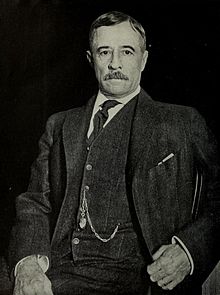John M. Parker (politician, 1863)
John Milliken Parker (born March 16, 1863 in Bethel Church , Orleans Parish , Louisiana , now Mississippi , † May 22, 1939 in New Orleans , Louisiana) was an American politician and cotton merchant.
Early years and political advancement
John Parker attended Chamberlain Hunt Academy , Belle View Academy, and Eastman Business School . He then went into his father's cotton business, which he became head of in 1893. He was soon a member of several trade associations and became president of the New Orleans Cotton Exchange. During the First World War he was the head of the food administration ( Food Administrator ) in Louisiana on behalf of the federal government .
Parker initially joined the short-lived Progressive Party founded by Theodore Roosevelt . As their candidate, he applied unsuccessfully for the office of governor of Louisiana in 1916 . In the same year he was to become a candidate for the vice-presidency of this party. This did not happen because Roosevelt turned back to the Republicans and the party was more or less dissolved or merged into the Republican Party. Parker then became a member of the Democratic Party , which nominated him as a candidate for gubernatorial elections in 1920.
Louisiana Governor
After he was elected by the people on April 20, 1920, Parker was able to take up his new office on May 17 of that year. During his four-year tenure, many new roads were built in Louisiana, especially in rural areas. These were mostly gravel roads. At the time, there were hardly any paved roads in this state. At the same time, the Louisiana State University was built. These projects were financed with the help of tax increases. At that time, the farmers received state support. In 1921 a new constitution was passed for Louisiana.
The activities of the Ku Klux Klan represented a major problem . The Klan ruled some parts of the state and did not shy away from acts of violence. The governor sought help from the federal government to get this problem under control. Governor Parker also supported environmental protection, which was the exception rather than the rule in those days. The governor was also an intra-party opponent of the powerful Huey Long and its party organization in New Orleans. Parker's efforts to improve the education system were ineffective because the necessary budget was not available or because Parker refused to increase the budget accordingly for reasons of economy. Due to a constitutional clause, he was not allowed to stand for re-election in 1924. As a result, he resigned from office on May 19 this year.
After the end of his governorship, Parker devoted himself to his farm, where he tried out experimental forms of agriculture. He later became one of the main opponents of Huey Long along with former Governors Jared Y. Sanders and Ruffin Pleasant . John Parker died in May 1939. He had three children with his wife, Cecile Airey.
Web links
- John Parker at the National Governors Association (English)
- The governors of Louisiana
- John M. Parker in the database of Find a Grave (English)
| personal data | |
|---|---|
| SURNAME | Parker, John M. |
| ALTERNATIVE NAMES | Parker, John Milliken (full name) |
| BRIEF DESCRIPTION | American politician and cotton trader |
| DATE OF BIRTH | March 16, 1863 |
| PLACE OF BIRTH | Bethel Church , Orleans Parish , Louisiana , now Mississippi |
| DATE OF DEATH | May 22, 1939 |
| Place of death | New Orleans , Louisiana |

